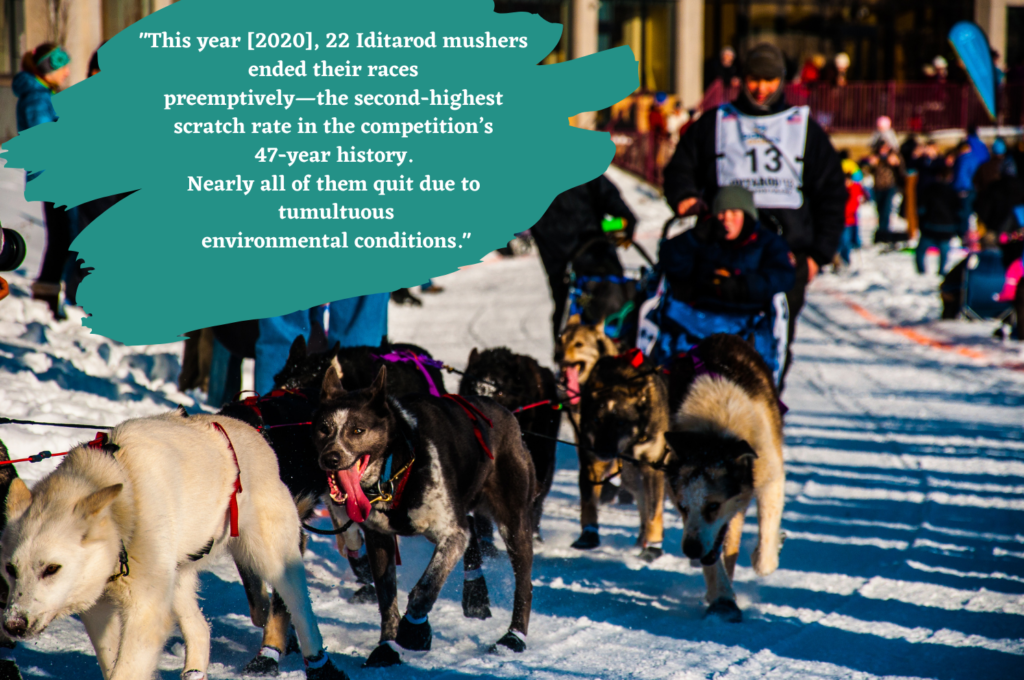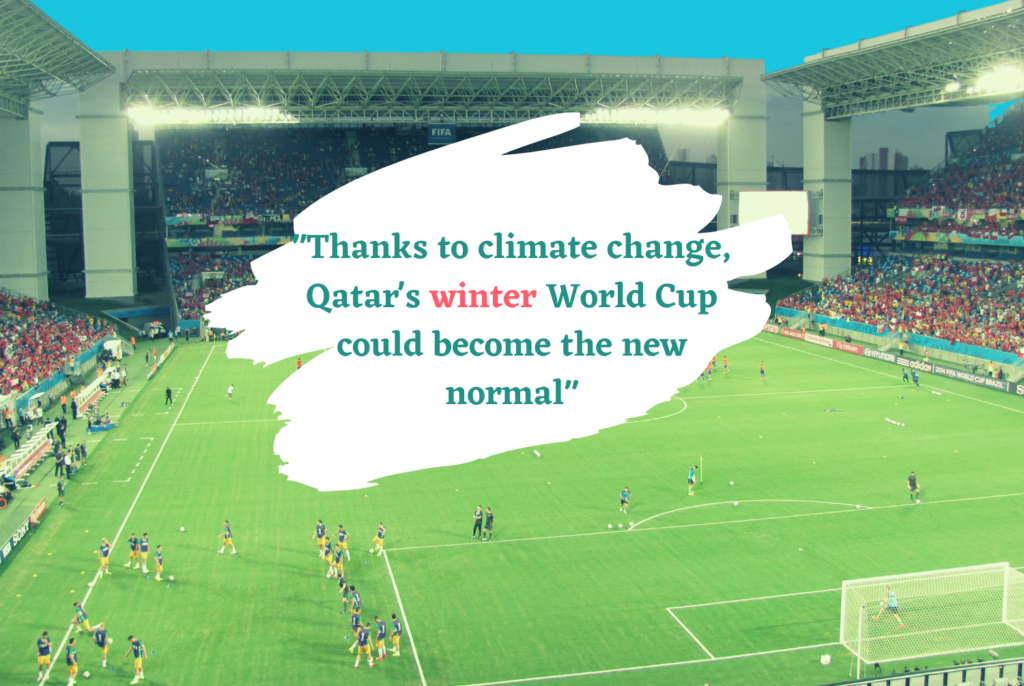Have you ever had to cancel your trip to a baseball game because smoke made the air quality too unhealthy? Or watched your favorite team play in the pouring rain? Unfortunately, you are not alone. Extreme weather, a consequence of rising temperatures, impacts professional sporting events and requires additional careful planning. Climate change is already transforming professional sporting events in multiple ways, in some cases even causing the complete cancellation of events.
How are professional sports events affected?
Typically, professional sporting events are a one-time occasion, and rearranging the timeline of matches is a stressful situation for fans, athletes, and managers. Location changes, timeline changes, or even the complete cancellation of events can have consequences for both athletes and fans.
Location Changes
Sporting events that are normally held in iconic locations may need to be relocated as a result of changes in weather and environment.

For instance, the Iditarod, a sled race held in March whose track runs from Anchorage, Alaska to Nome, Alaska, is already experiencing difficulty with their annual locations. The National Oceanic and Atmospheric Administration (NOAA) has reported a sharp decline in sea ice and snow cover during winter months in the Northern Hemisphere since the late 1970s, and the models predict that this decline will only continue.
With less snow cover and warmer temperatures, thin ice has rendered parts of Anchorage too dangerous for racing. A Foreign Policy article stated, “This year [2020], 22 Iditarod mushers ended their races preemptively—the second-highest scratch rate in the competition’s 47-year history. Nearly all of them quit due to tumultuous environmental conditions.” In 2015 and 2017, the race was rerouted and forced to start in Fairbanks instead of Anchorage because of the lack of snow and stable ice on the original path.
Additionally, host locations for events are becoming more limited due to climate change. Decreased snowfall is not only affecting the Iditarod, but also one of the biggest winter sporting events: the Winter Olympic Games. In 2018, the New York Times reported that at least nine former Winter Olympic Games host cities would no longer be reliable to host the Games because of their increasing temperatures and decreased snowfall.
Time Frame Changes

The schedules of sporting events have also had to be changed from their traditional time frames due to climate change.
The 2022 FIFA World Cup, traditionally hosted in the summer, has been moved to November because of rising temperatures. Qatar, the host city, experiences hot and dry summers with temperatures upward of 100 degrees Fahrenheit — a figure that regularly reaches new highs.
While places closer to the equator like Qatar already tend to have warmer temperatures than other parts of the world, a Quartz article says that “thanks to climate change, Qatar’s winter World Cup could become the new normal.”
Similarly, rising temperatures in Melbourne, Australia could permanently shift the timeline of the Boxing Day Test, the annual cricket match between the Australian national team and an opposing touring team. The Guardian reports that the match may need to be moved in future years to the night, or to a cooler month like November or March instead of the traditional Boxing Day in December to protect athletes and fans from heat exhaustion.
Cancellation of Matches and Events
Predictable weather events allow for matches and events to move forward through location and time frame changes. However, this is not always the case: unforeseen extreme weather can lead to the cancellation of some sporting events entirely.

The 2019 Rugby World Cup in Japan had to postpone matches because of unforeseen dangerous typhoons. Travelers who made the trip out had to give up their tickets to the matches because of schedule changes. Additionally, typhoons made fields wet, presenting safety issues during later matches in heavy rain.
Unpredictable weather can also create hazards that make environments unsafe for athletes to participate in their events. In 2018, the Camp Fire in Northern California caused the cancellation of the Berkeley Half Marathon due to unhealthy air quality that resulted from wildfires.
Moreover, at the beginning of 2020, a Slovenian tennis player, Davila Jakupovic, was forced to forfeit her match during the Australian Open because she had a coughing fit after playing in unhealthy air quality caused by Eastern Australia’s wildfires. “I wasn’t able to make more than three shots running left and right because I was already getting an asthma attack,” Jakupovic said during a CNN interview after the match. “I don’t have asthma normally.”
The future of professional sports depends on action being taken now.
As the effects of climate change become increasingly prevalent, sporting events will have to continue adjusting their timelines and locations. Fans will need to adjust to these changes as well and understand that the events may not happen. In order to save sporting events, people must take climate action now.
Sports teams themselves are taking climate action by participating in efforts such as Recycle Across America that help bring light to the effects of climate change on sports. Fans are also doing their part to reduce their footprint while attending sporting events by carpooling to the stadiums and reducing the waste they produce during the game.
Sports fans, teams, and athletes must all do their part in order to continue to enjoy sporting events as they know them. An easy first step is to sign the Global Climate Pledge and join the fight against climate change. If you are an athlete or a fan, make sure to also check out the Global Climate Pledge’s toolkits on how athletes can engage in climate action and how fans can rally for climate action.
Together we can come together to save sporting events from the effects of climate change.






